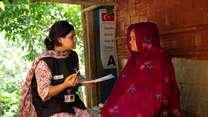In 2012, inter-communal violence in Myanmar's Rakhine state led to the displacement of approximately 145,000 people, 94% of whom were Muslim. Around 76,000 Muslim internally displaced people (IDPs) were temporarily housed in 11 planned camps in rural Sittwe Township. They were subject to heavy restrictions on their freedom of movement and unable to return to their areas of origin.
Shortly after their arrival, 8-10 families were housed in temporary longhouses under the same roof, separated by flimsy partitions, which fell well short of SPHERE standards for basic shelter.
The SPHERE standards refer to internationally recognized principles and universal minimum standards for the delivery of quality humanitarian response. As of December 2016 — four years after their initial displacement — the vast majority of these families continue to experience the same shelter conditions.
The International Rescue Committee has witnessed the debilitating impact that sub-standard shelter conditions have had on the health and psychological well-being of internally displaced people. This cannot continue. This IRC has drawn together available evidence to illustrate the impact of unacceptable conditions, and to inform actions to address them. With durable solutions for the Sittwe camps still a distant prospect, greater efforts must be made to ensure that the residing displaced populations can live safer, healthier and more dignified lives in the interim.
Report



